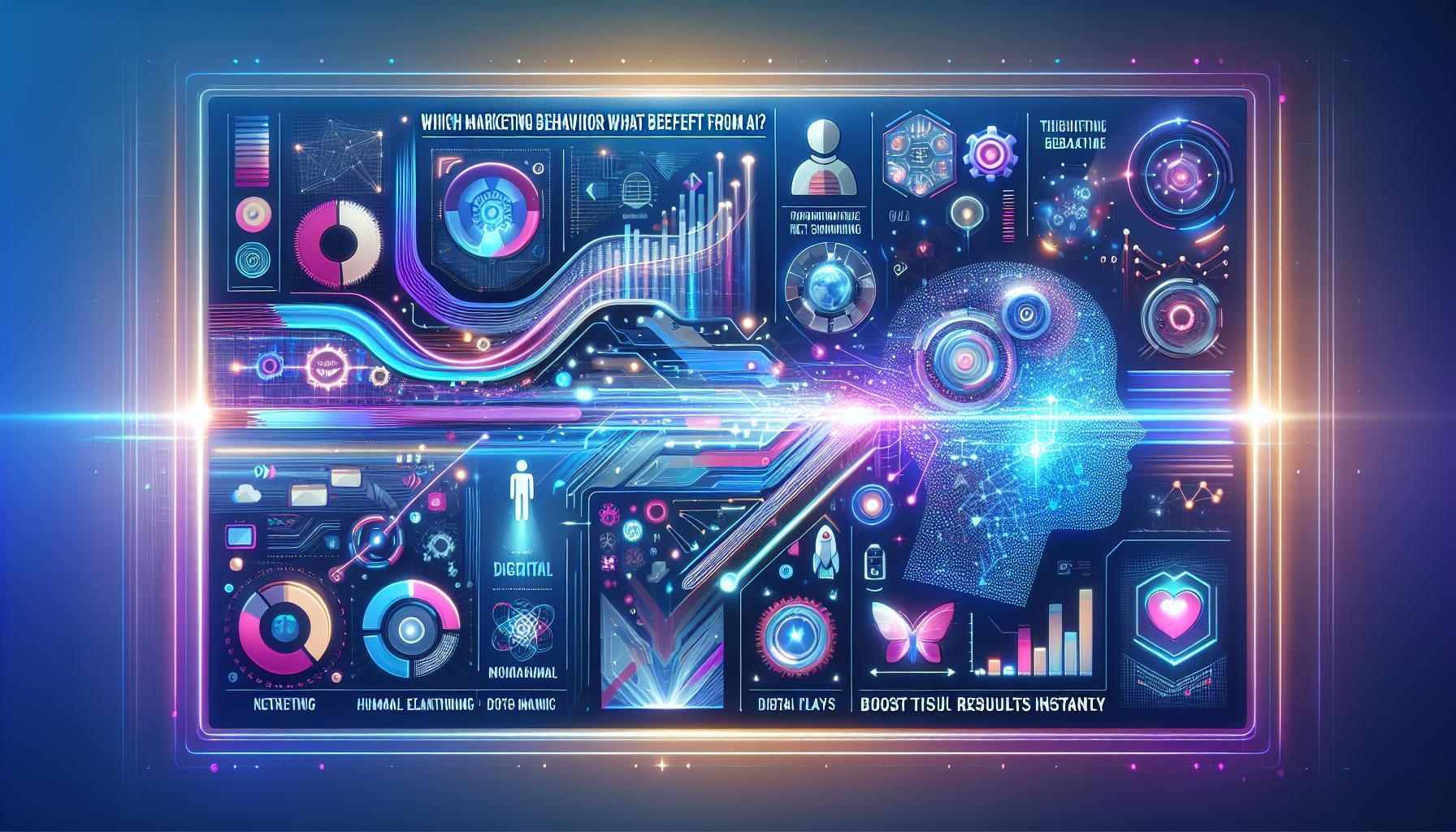In today’s fast-paced digital landscape, marketers face the constant challenge of maximizing their impact while navigating overwhelming data. Harnessing artificial intelligence can revolutionize marketing strategies, identifying behaviors that drive engagement and conversions. By integrating AI, businesses can streamline processes and enhance decision-making, ensuring instant boosts in results and a competitive edge.
Understanding AI in Marketing: What You Need to Know
In today’s rapidly evolving digital landscape, businesses are increasingly harnessing the power of artificial intelligence (AI) to transform their marketing strategies. By leveraging AI technologies, organizations can significantly enhance customer engagement, optimize campaign performance, and drive better results. With its ability to process vast amounts of data, AI allows marketers to make data-driven decisions that can lead to more personalized and impactful marketing efforts.
Key Benefits of AI in Marketing
AI enhances various marketing behaviors, driving efficiencies and improving outcomes across the board. Here are some of the key areas where AI can make an immediate impact:
- Customer Segmentation: AI algorithms can analyze consumer data to identify distinct customer segments. This enables marketers to tailor their messaging and offers, maximizing engagement.
- Predictive Analytics: By utilizing machine learning, businesses can predict customer behaviors and trends, allowing for more proactive marketing strategies.
- Personalization: AI enhances the ability to deliver personalized experiences at scale, ensuring that each customer receives relevant content and offers based on their preferences and behaviors.
- Campaign Optimization: Automated A/B testing and performance monitoring powered by AI can significantly reduce the time and resources spent on less effective strategies, helping marketers focus on what works best.
Another critical aspect of AI in marketing is its ability to improve the customer journey. Machine learning can analyze touchpoints across different channels and devices, providing insights into how customers interact with brands. This information allows businesses to create seamless customer experiences, ensuring that each interaction is timely and relevant.
Real-World Applications of AI
In practice, many successful companies have already implemented AI-driven strategies to boost their marketing performance. For instance, Netflix uses AI algorithms to analyze viewing patterns and recommend content tailored to individual users. This level of personalization has been a crucial factor in retaining subscribers and enhancing user satisfaction.
Moreover, retail giants like Amazon utilize AI for product recommendations and inventory management. By predicting which products will be in demand based on historical data and current trends, they can optimize stock levels and reduce the risk of stockouts.
| Marketing Behavior | AI Application | Expected Outcome |
|---|---|---|
| Customer Segmentation | Data analysis for targeted marketing | Higher conversion rates |
| Campaign Optimization | Automated A/B testing | Increased ROI |
| Predictive Analytics | Trend forecasting | Improved customer retention |
| Personalization | Customized recommendations | Enhanced user experience |
By understanding how AI can enrich various marketing behaviors, businesses can position themselves to leverage these technologies effectively. The integration of AI not only drives immediate results but also paves the way for sustained growth in an increasingly competitive market. Embracing AI as part of a comprehensive marketing strategy is crucial for any organization looking to boost results instantly and remain relevant in the digital age.
Personalization at Scale: How AI Enhances Customer Experience
In today’s fast-paced digital marketplace, delivering personalized experiences has become vital for businesses striving to stand out. Recent advancements in artificial intelligence have made it possible to tailor interactions at scale, transforming customer experience into a highly individualized journey. AI tools analyze vast amounts of customer data, leading to insights that enable brands to anticipate needs and preferences before consumers even articulate them. This not only enhances satisfaction but also fosters greater loyalty as customers feel understood and valued.
Understanding Customer Preferences Through Data
One of the key ways AI enhances personalization is through its ability to collect and analyze customer data across various platforms. Businesses can make use of machine learning algorithms that segment audiences based on behavior, preferences, and past interactions. By leveraging these insights, companies can craft targeted marketing strategies that resonate with specific customer segments. For example, an online retailer might analyze browsing history to recommend products uniquely suited to individual shoppers, significantly increasing the likelihood of a purchase.
- Behavioral targeting: Deliver messages based on user actions.
- Predictive analytics: Anticipate future customer needs based on past behavior.
- Real-time personalization: Adjust content dynamically as customers interact with the platform.
Creating Consistency Across Channels
AI-powered systems ensure that personalization is sustained across all customer touchpoints, creating a seamless experience. Whether customers are interacting with a brand via social media, email, or a website, the AI keeps track of their preferences and uses that data to inform future interactions. This holistic approach means that customers receive consistent messaging, making them more likely to engage and convert.
| Channel | Personalization Strategy |
|---|---|
| Customized product recommendations based on past purchases. | |
| Social Media | Targeted ads that reflect user interests and browsing history. |
| Website | Dynamic content that changes based on user profiles. |
Adopting AI not only boosts efficiency in targeting customers but also elevates the overall customer experience. By implementing advanced machine learning technologies, brands can engage in marketing behaviors that substantially benefit from AI, providing consistent, personalized experiences that can remarkably lift marketing results—creating a landscape where customer satisfaction and business performance go hand-in-hand, showcasing the potential encapsulated in the concept of “Which Marketing Behavior Can Benefit from AI? Boost Results Instantly.”
Data-Driven Decision Making: Leveraging AI Insights for Strategy
In today’s fast-paced digital landscape, the ability to harness data effectively can distinguish successful businesses from their competitors. As decision-makers increasingly turn to artificial intelligence (AI) for insights, they unlock opportunities to refine their marketing strategies and drive significant growth. By leveraging data-driven decision-making, organizations can transform raw data into actionable strategies that resonate with their target audience. AI tools can analyze vast amounts of information, revealing trends and allowing for a more nuanced understanding of customer behaviors and preferences.
Integrating AI into Marketing Strategies
The integration of AI insights into marketing strategies can lead to remarkable improvements in campaign performance. Here are several key marketing behaviors that can benefit significantly from AI:
- Personalization: AI allows for tailored content delivery by analyzing consumer behavior, preferences, and past interactions. For example, e-commerce platforms like Amazon utilize AI algorithms to recommend products based on individual shopping history, enhancing user experience and driving sales.
- Predictive Analytics: Utilizing machine learning models, businesses can predict future consumer actions and market trends. For instance, Netflix employs predictive analytics to suggest shows and movies, ensuring higher viewer retention and satisfaction.
- Real-time Insights: AI-powered tools facilitate immediate data analysis, enabling marketers to adjust their strategies on-the-fly. Social media platforms often use AI to provide real-time feedback on marketing campaigns, allowing for quick optimization based on engagement metrics.
- Customer Segmentation: Advanced segmentation techniques powered by AI enable businesses to categorize customers more effectively, allowing for more precise targeting of marketing efforts. Companies can identify and reach niche markets, enhancing conversion rates.
Driving Results Through Data-Driven Strategies
Leveraging these AI capabilities not only optimizes current marketing efforts but also lays a robust foundation for future initiatives. To effectively implement these strategies, businesses should:
1. Invest in AI analytics tools that provide comprehensive insights.
2. Foster a data-driven culture where decisions are grounded in analytics rather than intuition alone.
3. Continuously test and refine strategies based on data feedback to ensure resilience and adaptability.
The impact of adopting a data-driven approach is profound. Studies indicate that organizations employing robust data-driven decision-making practices report three times greater improvement in performance than their less data-reliant counterparts [[3]](https://online.hbs.edu/blog/post/data-driven-decision-making). Thus, capitalizing on AI insights not only streamlines marketing processes but also positions companies to thrive in an increasingly competitive environment.
Automating Routine Tasks: Freeing Up Time for Creative Marketing
Marketing teams often find themselves inundated with mundane tasks that consume time and resources, detracting from the creative strategies that truly drive engagement and growth. A staggering percentage of their workdays can be spent on repetitive, low-value activities such as sorting through data, publishing content, or analyzing customer interactions. By embracing automation, these teams can unleash their potential, channeling their creativity into crafting impactful marketing campaigns that resonate with their audience.
Leveraging AI for Routine Tasks
Artificial Intelligence (AI) is transforming the marketing landscape by enabling brands to automate a plethora of core tasks. Here are a few major areas where AI can make a substantial difference:
- Email Marketing: Automated tools can segment audiences, personalize content, and optimize sending times, ensuring messages reach the right people at the right moment.
- Social Media Management: AI-driven platforms can schedule posts, analyze engagement metrics, and even suggest content, allowing marketers to focus on strategy over execution.
- Customer Support: Chatbots equipped with AI provide immediate responses to common queries, enhancing user experience and freeing up team members to tackle more complex tasks.
- Data Analysis: AI algorithms can analyze massive datasets quickly, providing actionable insights that guide strategic decisions and future campaigns.
Practical Implementation Examples
Consider a mid-sized e-commerce business struggling to engage its customer base through email marketing. By utilizing an AI-driven email automation tool, they can segment their audience based on shopping behaviors, automatically send personalized recommendations, and track campaign performance with minimal manual intervention. This not only enhances customer experience but also significantly increases the conversion rates, as messages become more tailored and relevant.
In another case, a digital marketing agency may encounter bottlenecks during social media campaign planning. An AI platform that automates post scheduling and analyzes sentiment around trends allows the team to pivot strategies in real-time. The shift in focus from tedious scheduling to creative content development leads to enhanced campaign performance and customer interaction.
| Task | AI Automation Benefits | Time Saved |
|---|---|---|
| Email Campaign Creation | Segmentation, personalization | Up to 12 hours/week |
| Social Media Posting | Auto-scheduling, performance tracking | Up to 10 hours/week |
| Customer Support | 24/7 chatbot availability | On-demand, no specific hours lost |
By automating these routine tasks, marketers can shift their focus towards more creative pursuits, such as developing innovative campaigns or building strong relationships with customers. The question remains: how can your organization leverage AI-driven solutions to enhance productivity and allow for more imaginative engagement strategies?
Predictive Analytics: Anticipating Trends and Customer Behavior
Data-driven decisions in marketing are more critical than ever, especially as businesses seek to understand and anticipate customer behavior with precision. Predictive analytics serves as a powerful tool that harnesses historical data and applies sophisticated statistical techniques to not just understand what has happened, but to predict future outcomes. By leveraging these insights, companies can refine their marketing strategies and enhance customer experiences, addressing the question of which marketing behaviors can benefit from AI and lead to instantaneous results.
One of the most compelling applications of predictive analytics is in customer segmentation. By analyzing past purchase behavior, demographic information, and interaction patterns, businesses can develop highly targeted marketing campaigns that resonate with different customer segments. For example, a retail company might identify that a specific group of customers is more likely to purchase seasonal items online. Armed with this predictive insight, they can tailor email campaigns featuring relevant products, ultimately increasing conversion rates.
In addition to targeted marketing, predictive analytics enhances customer sentiment analysis, enabling brands to gauge consumer attitudes and preferences in real-time. This proactive approach allows businesses to adjust their marketing tactics based on predicted customer reactions. By analyzing social media activity and customer feedback, companies can anticipate which products are likely to succeed and identify potential challenges before they escalate.
Another significant advantage lies in optimizing inventory and supply chain management. Businesses can use predictive analytics to forecast demand for specific products, ensuring they maintain optimal stock levels. This capability not only prevents lost sales due to stockouts but also reduces excess inventory costs. For instance, a fashion retailer may utilize past sales data combined with current market trends to predict which items will be most popular during the upcoming season, enabling smarter purchasing decisions that align with customer demand.
In summary, embracing predictive analytics empowers companies to anticipate trends and customer behavior effectively. By implementing data-driven strategies, organizations can significantly enhance their marketing effectiveness, ensuring they respond swiftly to emerging opportunities and challenges in an ever-evolving marketplace.
Enhancing Content Creation: AI Tools for Engaging Marketing Materials
Imagine transforming mere concepts into captivating narratives or dynamic visuals with the push of a button. This is the power of AI tools in content creation—the secret sauce that can invigorate marketing strategies and lead to instant results. Leveraging advanced algorithms, these tools help marketers enhance their engagement and reach by producing high-quality content that resonates with their audience. With options ranging from text generation to automated design, AI is reshaping the landscape of marketing materials, driving businesses towards success.
One of the foremost benefits of using AI in content creation is its ability to produce engaging text effortlessly. Tools like ChatGPT and Jasper can generate blog posts, social media updates, and marketing copy, allowing marketers to focus on strategy while automating repetitive writing tasks. For instance, a business could use AI to draft an entire series of promotional emails in minutes, freeing up precious resources that can be redirected to analytics and audience research to further boost results. When paired with SEO tools, these AI writers can optimize content for search engines automatically, ensuring visibility without sacrificing quality.
Visual Content Creation
Content isn’t just about words; it’s also about visuals. AI-driven graphic design tools like Canva and Adobe Express are making it easier than ever to create stunning marketing materials. These platforms allow users to generate tailored visuals, from social media graphics to infographics, with minimal design experience required. Utilizing the built-in templates and customization options, marketers can quickly produce eye-catching visuals that grab attention and amplify messaging across multiple platforms.
Furthermore, AI tools can analyze audience engagement across various formats, helping marketers refine their approaches continually. For example, A/B testing tools powered by AI can automate the process of determining which headlines, images, or formats yield the best responses. This data-driven approach not only enhances content effectiveness but ensures that marketing efforts are constantly evolving based on real-time feedback.
Incorporating AI tools into your content strategy isn’t just about keeping up with trends; it’s about staying ahead in a digital landscape. By embracing these technologies, marketers can enhance their capabilities, streamline processes, and ultimately boost results. With the right tools in place, the potential to engage your audience meaningfully and effectively is at your fingertips, paving the way for greater success in your marketing endeavors.
Optimizing Ad Campaigns: Using AI for Better ROI
Harnessing the power of artificial intelligence (AI) for advertising campaigns is becoming increasingly essential as businesses strive to achieve greater returns on investment (ROI). With the capability to analyze vast amounts of data in real-time, AI enables marketers to fine-tune their strategies, making it a game changer in driving engagement and conversions. In fact, according to a recent study, companies leveraging AI in their advertising efforts have reported up to 30% higher ROI compared to those that have not.
How AI Enhances Ad Targeting
One of the most significant advantages of AI in ad campaigns is its ability to optimize targeting. Traditional advertising methods often rely on broad demographics, but AI allows marketers to refine their approach and reach specific audiences with ease. By utilizing machine learning algorithms, AI can assess user behavior, preferences, and engagement patterns, thus identifying high-potential customer segments. Here are some ways AI can enhance ad targeting:
- Predictive Analytics: AI analyzes historical data to forecast future behavior, enabling marketers to preemptively reach users who are likely to convert.
- Dynamic Segmentation: Rather than static audience categories, AI continuously updates segments based on real-time interactions and preferences.
- Personalized Content: By understanding user interests, AI can tailor ad content to individual users, significantly increasing relevance and engagement.
Real-Time Adjustments and A/B Testing
Another critical benefit of incorporating AI into ad campaigns is its ability to perform real-time adjustments and optimize A/B testing processes. Traditional A/B testing can be time-consuming and often yields results long after a campaign launch. AI accelerates this process by automatically running multiple versions of ads and learning which variations perform best under different conditions.
| Traditional A/B Testing | AI-Driven Testing |
|---|---|
| Requires manual oversight and time-intensive analysis. | Automates testing and optimization in real-time. |
| Results are usually available after the campaign has progressed. | Insights generated instantly, allowing for immediate campaign adjustments. |
| Limited variations tested due to resource constraints. | Tests numerous variations continuously for maximized performance. |
By harnessing AI for real-time A/B testing, marketers can adapt their strategies on the fly, ensuring that their ad spend is allocated effectively and delivering maximal ROI.
Optimizing Ad Spend with AI Insights
Analyzing ad performance data can be overwhelming, but AI simplifies this by providing actionable insights. AI tools spot trends and patterns that may not be immediately obvious, allowing marketers to make data-driven decisions regarding their ad budgets. By reallocating funds toward higher-performing ads or channels, companies can significantly enhance their return on investment.
Incorporating AI within marketing strategies not only improves targeting and personalization but also maximizes efficiency in managing ad spends. As organizations increasingly ask “Which Marketing Behavior Can Benefit from AI? Boost Results Instantly,” the answer lays in leveraging AI technologies that transform ad campaigns into responsive, high-performing assets that resonate with their intended audience.
Social Media Management: AI’s Role in Engaging Audiences
In today’s digital age, effectively engaging audiences on social media platforms requires not just creativity but also the strategic implementation of technology. Artificial Intelligence (AI) has emerged as a game-changer in social media management, providing tools that enhance engagement through personalization, data analysis, and automation. Leveraging AI can lead to immediate improvements in marketing behavior, making it easier for brands to bolster their online presence and connect with their audiences.
Transforming Engagement Strategies with AI
AI offers unprecedented capabilities in understanding audience preferences and behaviors. By analyzing vast amounts of data, AI tools can identify trends, predict user engagement patterns, and suggest optimal posting times. This enables marketers to craft messages that resonate with their audience, enhancing the overall effectiveness of social media campaigns. For example:
- Sentiment Analysis: AI can gauge audience sentiment towards a brand through comments and interactions, allowing companies to adjust their strategies accordingly.
- Content Recommendations: Algorithms can suggest content that aligns with audience interests, thereby increasing the likelihood of shares and comments.
- Dynamic Targeting: AI systems can tailor messages to specific demographics, ensuring that the right content reaches the right people at the right time.
The integration of AI not only streamlines social media management workflows but also enhances community engagement. Tools like Hootsuite and Buffer utilize AI-driven functionalities that assist brands in scheduling posts intelligently, monitoring performance, and even automating responses to frequently asked questions. As a result, marketers can maintain a consistent presence on social platforms, ultimately leading to improved customer relationships and loyalty.
Practical Applications of AI in Social Media Management
By adopting AI technologies, brands can witness tangible improvements in their social media efforts. Companies like IKEA and Adobe have successfully used AI for social media insights and content optimization, proving that embracing advanced tools can yield significant results. Here are a few actionable steps businesses can consider:
- Invest in AI-powered analytics tools to gain insights into audience behavior and preferences.
- Utilize chatbots for immediate customer service responses to enhance user experience and engagement.
- Test AI-based scheduling for social media posts to find optimal engagement times.
Through these enhancements, the question of which marketing behavior can benefit from AI becomes increasingly relevant as brands strive to boost results instantly. Harnessing AI for social media management not only fosters deeper engagement but also ensures that brands stay competitive in an ever-evolving digital landscape.
Improving Customer Service: AI Chatbots and Virtual Assistants
The rapid evolution of technology has transformed the way businesses interact with customers, leading to the rise of AI chatbots and virtual assistants as essential tools for enhancing service delivery. These AI-driven solutions not only streamline customer service operations but also provide a personalized experience that can significantly boost customer satisfaction. With their ability to engage with users 24/7, chatbots can handle a multitude of inquiries simultaneously, drastically reducing wait times and improving response rates. This capability is especially beneficial for businesses looking to implement strategies that can enhance customer interactions, thus lending credence to the idea that Which Marketing Behavior Can Benefit from AI? Boost Results Instantly is a pivotal inquiry for modern enterprises.
Customer Engagement Through Automation
AI chatbots excel in creating a seamless communication channel between businesses and customers. They can provide instant answers to frequently asked questions, guide users through complex decision-making processes, and even assist in making purchases. Utilizing natural language processing (NLP), these chatbots can understand and interpret customer queries with impressive accuracy. For instance, companies can deploy chatbots capable of answering product inquiries, troubleshooting issues, or helping customers navigate their services without human intervention. This not only empowers customers with quick solutions but also frees up human agents to focus on more complex inquiries.
Data-Driven Insights for Improvement
Moreover, implementing AI chatbots allows businesses to gather valuable data on customer preferences and behaviors. This data can help refine marketing strategies and improve the overall service experience. For example, analyzing common queries can reveal gaps in product knowledge or service offerings, prompting businesses to enhance their staff training or expand their service catalog. By continuously learning from interactions, AI chatbots evolve to meet customer needs better, aligning with the essence of Which Marketing Behavior Can Benefit from AI? Boost Results Instantly by directly translating customer feedback into actionable changes.
Real-World Examples of Success
Numerous brands have successfully integrated chatbots into their customer service frameworks, witnessing significant improvements in customer engagement and satisfaction metrics. For instance, a leading airline implemented a chatbot for flight booking and customer inquiries, resulting in a 30% reduction in call center volume and a 25% increase in customer satisfaction ratings. Such real-world applications illustrate the impact AI-driven solutions can have in optimizing operations and enhancing customer interactions.
By understanding the transformative role of AI chatbots and virtual assistants, businesses can set themselves on a path to not only maintain competitive advantage but also foster deeper customer relationships. Embracing these technologies effectively answers the question of Which Marketing Behavior Can Benefit from AI? Boost Results Instantly, highlighting their vital place in contemporary marketing strategies focused on customer-centricity.
FAQ
Which Marketing Behavior Can Benefit from AI? Boost Results Instantly?
The marketing behaviors that can benefit from AI include customer segmentation, predictive analytics, and personalization. These strategies leverage AI to enhance targeting and improve engagement, ultimately boosting results effectively and swiftly.
By utilizing AI in customer segmentation, marketers can analyze vast amounts of data to identify specific groups and tailor campaigns accordingly. Predictive analytics allows businesses to forecast trends and consumer behavior, ensuring timely and relevant interactions. Personalization employs AI to deliver customized content, significantly increasing customer engagement and conversion rates.
How does AI enhance customer segmentation in marketing?
AI enhances customer segmentation by analyzing large datasets quickly to identify patterns and trends. This enables marketers to create more targeted and effective campaigns that resonate with their audience, ultimately leading to improved results.
Through machine learning algorithms, AI can segment customers based on behaviors, preferences, and demographics. For instance, a retailer might use AI to segment shoppers into behavior-based groups, facilitating targeted marketing strategies that directly appeal to each segment, thereby optimizing ROI.
What is predictive analytics in marketing, and why is it important?
Predictive analytics in marketing refers to using AI and statistical algorithms to predict future customer behaviors and trends. This approach is crucial as it helps businesses make informed decisions to enhance marketing strategies and allocate resources effectively.
With predictive analytics, companies can anticipate customer needs and preferences, allowing them to deliver personalized experiences. For example, a streaming service might recommend shows based on a viewer’s past habits, increasing user engagement and satisfaction. To dive deeper into predictive analytics, check out our article on its benefits in marketing.
Can I use AI for content creation in my marketing strategy?
Yes, AI can significantly enhance content creation by providing insights and generating personalized content that aligns with audience preferences. This eliminates guesswork, helping to craft more engaging and relevant marketing messages.
AI tools can analyze successful content patterns, enabling marketers to create articles, social media posts, and emails that resonate. For instance, some AI applications can suggest headlines that perform well or even draft full articles. This ensures content is not only creative but also effective in driving engagement.
Why does personalization matter in marketing, and how can AI help?
Personalization matters in marketing because it creates a tailored experience for consumers, increasing engagement and conversion rates. AI facilitates this by analyzing customer data and delivering customized recommendations and offers.
Through machine learning algorithms, AI can learn individual preferences over time, allowing brands to communicate more effectively. For example, e-commerce platforms use AI to recommend products based on previous purchases. Personalization driven by AI not only enhances customer satisfaction but also fosters loyalty and trust.
What tools can I use for AI-driven marketing strategies?
Several AI tools are available to enhance marketing strategies, including chatbots, content generation platforms, and data analytics software. These tools provide capabilities that increase efficiency and improve customer interactions.
For instance, chatbots can handle customer inquiries 24/7, providing timely responses and freeing up human resources for other tasks. Additionally, platforms like Google Analytics utilize AI to provide insights into consumer behavior, helping marketers make data-backed decisions. Explore our section on AI tools for marketing for more in-depth information.
What are the challenges of implementing AI in marketing?
Implementing AI in marketing poses challenges, such as data privacy concerns, integration with existing systems, and the need for skilled personnel. Addressing these issues is critical for a successful AI strategy.
Data privacy is a significant concern, as businesses must comply with regulations like GDPR while utilizing customer data. Furthermore, integrating AI tools into existing marketing systems can require significant technical expertise and adaptability. It’s important to approach AI implementation with a clear strategy and ongoing training for your team.
Insights and Conclusions
As we conclude our exploration of how marketing behaviors can benefit from AI, it’s clear that the integration of advanced technology is not just a trend—it’s a transformative opportunity. By leveraging AI for customer segmentation, personalized content, predictive analytics, and automated campaigns, businesses can dramatically enhance their effectiveness and engagement.
Remember, harnessing AI technology is about understanding and meeting your audience’s needs more efficiently. Whether you’re a small business owner or a marketing professional at a large corporation, there are practical strategies you can implement right away to start seeing results.
We encourage you to delve deeper into the specific AI tools and techniques that align with your marketing goals. Stay curious, keep experimenting, and don’t hesitate to engage with the wealth of resources available. The world of AI is ever-evolving, and with continuous exploration, you can unlock its full potential to elevate your marketing strategies. Happy learning!





